| Article ID | Journal | Published Year | Pages | File Type |
|---|---|---|---|---|
| 2536194 | European Journal of Pharmacology | 2007 | 6 Pages |
Excessive sympathetic activity is believed to be the key arrhythmogenic factor both in the setting of acute myocardial infarction and during chronic heart failure. The aim of this study was to evaluate the effect of neuropeptide Y2 blockade on malignant ventricular arrhythmias in rats with acute myocardial infarction. Vagotonic dose-finding study for neuropeptide Y2 receptor antagonist, (S)-N2-[2-[4-[(R,S)-5,11-dihydro-6(6h)-oxodibenz[b,e]azepin-11-yl]-1-piperazinyl]-2-oxoethyl] cylopentyl] acetyl]-N-[2-[1,2-dihydro-3,5 (4H)-dioxo-1,2-diphenyl-3H-1,2,4-triazol-4-yl]ethyl]-argininamid (AR-H05359) was conducted in guinea pigs (n = 50) and rats (n = 3). Induction of postinfarction arrhythmias was conducted in Sprague–Dawley rats that were randomized into 3 groups. Neuropeptide Y2 antagonist treated rats (n = 7), placebo group (n = 10) and amiodarone treated rats (n = 8). Myocardial infarction was induced by ligation of the left coronary artery. Computerized telemetric ECG tracings were obtained continuously before induction of myocardial infarction and up to 120 min postinfarction. Occurrence of ventricular arrhythmias was analyzed according to a 10-point arrhythmia score. There was no difference in the arrhythmia scores between the neuropeptide Y2 and the saline group. The amiodarone treated animals had lower score compared to the neuropeptide Y2 and the placebo group (p < 0.05). The blockade of receptors does not reduce ventricular arrhythmias in the rats with acute myocardial infarction. Further studies are needed to evaluate whether increasing vagal tonus during sympathetic activation may be valuable anti-arrhythmic strategy to prevent sudden death in patients with myocardial infarction and heart failure.
